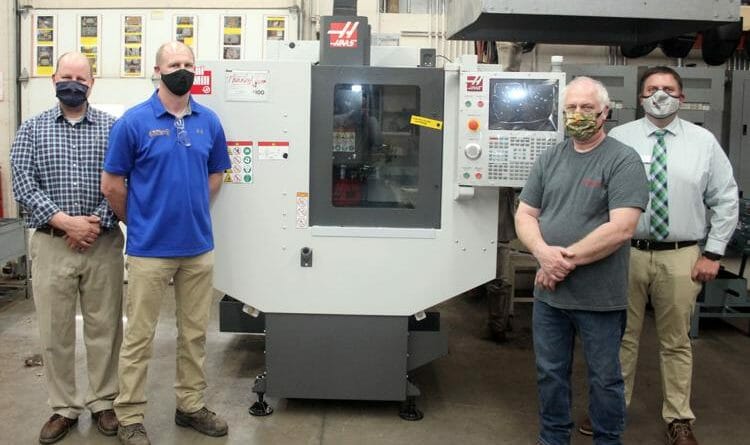MHS, CVTC and Machining Industry Partner to Boost Tech Ed Program
Ryan Sterry, career and technical education coordinator at Menomonie High School (MHS), has many reasons to be proud of the programs he leads. However, he realizes that maintaining quality is not accomplished by sitting still.
In early April, with the cooperation of school administration, local industry and Chippewa Valley Technical College, he accomplished one of his primary goals to improve tech ed at MHS with the installation of a new Haas Automation, Inc. CNC (computer numerical control) machine for manufacturing small metal parts.
The addition represents a leap forward for students, who can now learn on the high-tech equipment used in the CVTC Machine Tooling Technics program and found in the dozens of metals shops around the Chippewa Valley.
Adding the machine at MHS took help from many people, including financial donations from Ken Skar, owner of Vincent Tool in Chippewa Falls; and Tom Karis, owner of Menomonie Machine Tool, and support from Jeff Sullivan, dean of apprenticeships, engineering, manufacturing and IT at CVTC.
“There are so many great things about CVTC, but one is they really get partnerships,” Sterry said. Another is how CVTC works with local industry, something Sterry worked to emulate.
“This all started about four years ago when Ryan participated in teacher training in the summer at our manufacturing labs,” Sullivan recalls. “High school tech ed teachers didn’t have a background in Machine Tool.”
“We have strong engineering, construction, manufacturing and communications technology pathways in Menomonie,” said Sterry, a teacher there for over 20 years and an MHS graduate himself. “We have a strong tech ed program, but an area of need was in Machine Tool.”
MHS has some manual metals lathes, but no computerized machines, which are still uncommon in high school shops. As Karis, a 1980 MHS graduate, points out, students should learn the basics of metalworking on manual lathes first. But if the goal is to get students interested in the field, manual machines just don’t “cut it.”
“Manual machines just don’t have the ‘Wow’ factor of computerized machines,” Karis said.
MHS works with advisory committees made up of people in local businesses for technical education, much like CVTC does for all its programs. “We formed a separate committee for Machine Tool,” Sterry said.
“We had manual equipment, but not enough,” Sterry said. “We wrote some grants and got district support to buy more manual lathes. But we felt we needed to add a CNC machine. We wanted to mimic the program at CVTC.”
CVTC worked with MHS to establish two MHS Machine Tool classes that would also earn high school students CVTC credits. Sterry had his eyes on starting a third, which would utilize a CNC machine.
Sterry approached Brian Seguin, director of instruction for the school district with his idea. “We looked at how we could gain support and funding,” Seguin said. “Mr. Sterry has done a good job at looking at multiple funding sources.”
The advisory committee was in full support and provided advice on what kind of machine to buy, and district administration was behind it as well.
Sterry says tremendous credit goes to the business owners who made generous monetary contributions for the purchase. In the end, the school district funded about half of the approximately $45,000 cost, with donations and grants covering the rest.
Karis says he was happy to support the project because the industry needs to find ways to encourage young people to enter the field. “Forty years ago, when I went to the tech school, there was a shortage of machinists. There is still a shortage today.”
“They have a very active and growing metals program at Menomonie and want to take it to the next level,” Skar said. “Having a CNC machine opens up career paths for the students and generates interest at the high school level.”
Sterry will integrate the use of the CNC machine into the school’s advanced Machine Tool classes, then work with Sullivan and CVTC on setting up a dual credit class.
“We will work with them on the curriculum,” Sullivan said. “We have some classes in Machine Tool that are five credits, and in the past, we’ve broken them up so students could take two of the credits in a high school dual credit class and finish the other three at CVTC.”
Sullivan added that CVTC is already seeing more MHS graduates enrolling in Machine Tool at CVTC, just from the increased emphasis at the high school level. “The fact that they are teaching machining is important because there are so many jobs available.”
https://chippewa.com/community/dunnconnect/mhs-cvtc-and-machining-industry-partner-to-boost-tech-ed-program/article_3ede83e4-c035-5010-beed-b6cc64d20eb6.html

